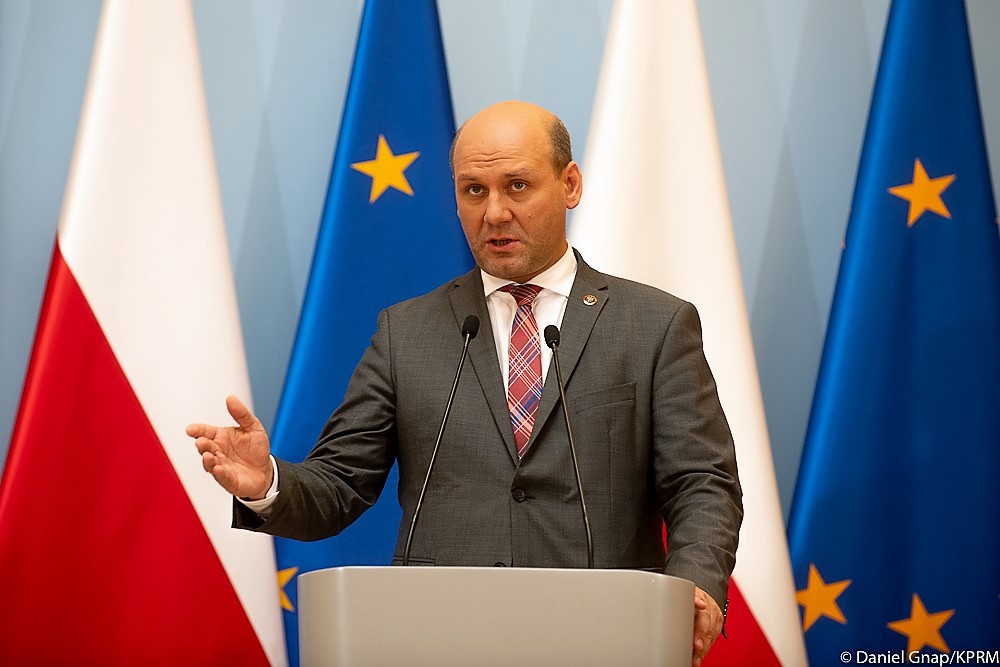Poland “cannot accept any diktats from European institutions” in negotiations with Brussels over unlocking European funds, says its minister for EU affairs, Szymon Szynkowski vel Sęk. While Warsaw is willing to allow “some space for flexibility”, it “will not back down” from certain “lines that cannot be crossed”.
His remarks follow a visit to Brussels – the first since being appointed to his position last month – during which Szynkowski vel Sęk met with European Commission Vice President Věra Jourová and the justice commissioner, Didier Reynders.
Afterwards, Jourová said that the talks had been “constructive” and that Poland is moving “in the right direction”. But she warned that Warsaw must still “meet in full” Brussels’ demands in order to release almost €36 billion in post-pandemic recovery funds frozen due to rule-of-law concerns.
Speaking to broadcaster Radio Zet this morning, however, Szynkowski vel Sęk struck a different tone. He said that he felt the commission has “taken note of the fact that our position is very clear and that we will not back down”.
“I said where there are lines that cannot be crossed: nothing can be introduced that would be unconstitutional, would undermine the prerogatives of the [Polish] president to nominate judges, would go beyond the [EU] treaties in terms of the competences of the European institutions,” he added.
The Polish government has long argued that the European Commission and European Court of Justice have been illegitimately acting beyond their legal competences by attempting to force Poland to undo some of the judicial reforms introduced by the ruling Law and Justice (PiS) party.
PiS figures, including party chairman Jarosław Kaczyński, have also claimed that, by closing down a disciplinary chamber for judges in July, Poland met one of the key conditions for unlocking frozen funds. The European Commission, however, has insisted that that step was not sufficient in itself.
Szynkowski vel Sęk told Radio Zet that, in his view, Poland has fulfilled the requirements regarding the judiciary agreed with Brussels. But “in this matter, the European Commission’s opinion is different”. This leaves Poland with two possibilities, he said.
Either “we stand in principle by our position and do nothing, knowing that there is no willingness on the part of the commission to process our payment request”. Or “we examine again the commission’s doubts, clarify which parts are not accurate, and see what else we can do on our side”.
🎥 Minister ds. europejskich @SzSz_velSek zapowiada: W czwartek znów jadę do Brukseli. Nie możemy godzić się na dyktat ze strony instytucji europejskich@RadioZET_NEWS #GośćRadiaZET #Rymanowski
Więcej tu ⬇️https://t.co/v13CVG03qg pic.twitter.com/1AO9BTAqqy
— Gość Radia ZET (@Gosc_RadiaZET) November 15, 2022
The government has chosen the second path, said Szynkowski vel Sęk. “We are ready for flexibility in some details…within a space that does not violate our sovereignty and principles”, but “we cannot accept any diktats from European institutions”.
“Poland has fulfilled 95% [of its commitments agreed with the European Commission] and is ready to fulfil the remaining 5%,” he added. But “We expect specifics from the European Commission” about what is required.
Senior PiS figures have also suggested that Brussels is withholding Poland’s money not because of genuine concerns over the rule of law – which they claim Warsaw has in any case addressed – but because it is trying to force a change in government, bringing opposition leader Donald Tusk to power.
Asked by Radio Zet if the EU wants to replace the current government with one led by Tusk, Szynkowski vel Sęk claimed that “Such words were spoken…To a large extent, I see such tendencies there”.
He called on the European Commission to make clear “whether it is ready to fulfil its commitment that we should be able to submit an application for payment from the [EU post-pandemic recovery fund], along with the readiness of the European Commission to implement it efficiently”.
Only “when we are sure that it will not be refused” will Poland finally submit its application to receive the funds, said the minister.
An EU official was prevented from speaking at the opening of a tunnel in Poland that was built mostly with EU funds.
The government had previously agreed he could speak. But in the end only Polish officials did so, and a bishop blessed the tunnel https://t.co/ekHv0K9Hpg
— Notes from Poland 🇵🇱 (@notesfrompoland) November 14, 2022
Main image credit: Daniel Gnap / KPRM (under CC BY-NC-ND 3.0 PL)

Daniel Tilles is editor-in-chief of Notes from Poland. He has written on Polish affairs for a wide range of publications, including Foreign Policy, POLITICO Europe, EUobserver and Dziennik Gazeta Prawna.




















